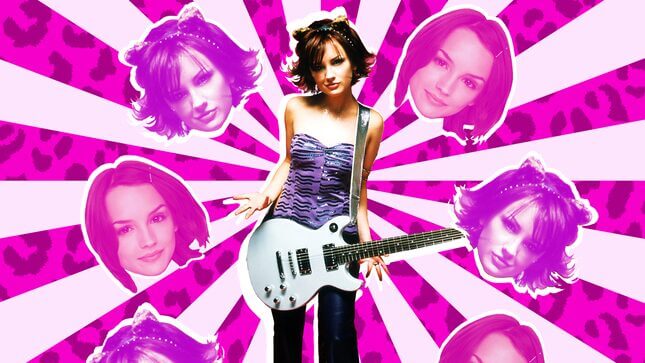Rachael Leigh Cook on Josie, Sexism, and All the Haircuts She Made Us Get
In Depth
Graphic: Elena Scotti (Photos: Getty Images, Miramax)
In a 2001 review, Roger Ebert wrote, “Josie and the Pussycats are not dumber than the Spice Girls, but they’re as dumb as the Spice Girls, which is dumb enough.” Like so much 2000s culture that was created for and featured young women, Josie and the Pussycats had to wait 20 years to be given a fair evaluation not saddled with all the sexist baggage teenagers and young women were meant to carry at the time.
In the years since its release, not only has Josie proven not dumb, but incredibly smart, lampooning a culture that builds pop stars as marketing tools and literally destroys them as soon as they can no longer sell Sketchers to teenagers, a conversation that has become commonplace in collective reconsideration of the ways in which celebrities like Britney Spears were made and broken by the late ’90s and early ’00s fame machine.
And while that conversation continues, Josie fans are finally getting their say, as the Archie universe has once again been reimagined for new audiences in the hit show Riverdale and a new Robot Chicken special. One of those fans is its star Rachael Leigh Cook, who spoke with Jezebel about Josie and the Pussycats, reprising her role for Robot Chicken, Riverdale, and all the other things she’s been telling us were cool since the ’90s that are just now only getting the critical appreciation they deserved. A condensed and edited transcript of our conversation below.
JEZEBEL: Are you aware that you made us all get the pixie cut/bob thing that looked so great on you after She’s All That, and it made us look terrible in our yearbook photos?
Rachael Leigh Cook: I had a professional styling me! It did not stick around long after filming was over. Let me be clear. I’m sorry for that. I do think it’s less problematic than the Josie McCoy haircut. That spiky feathery thing—that’s a real specific person that can pull it off and I don’t feel that it was me.
I have recently learned that was a wig.
Half the time it was, yeah, because we tried to dye my hair red and red doesn’t stay in and then your hair’s a weirdo pink color like almost the next day. We wanted it to be really vibrant for the movie but the only way to do that without dying it every four days or so was a wig. So for about half the movie, it’s my hair and the other half it’s a wig.
We all got that haircut too.
-

-

-

-

-

-

-

-

-

-

-

-

-

-

-

-

-

-

-

-

-

-

-

-

-

-

-

-

-

-

-

-

-

-

-

-

-

-

-

-








































